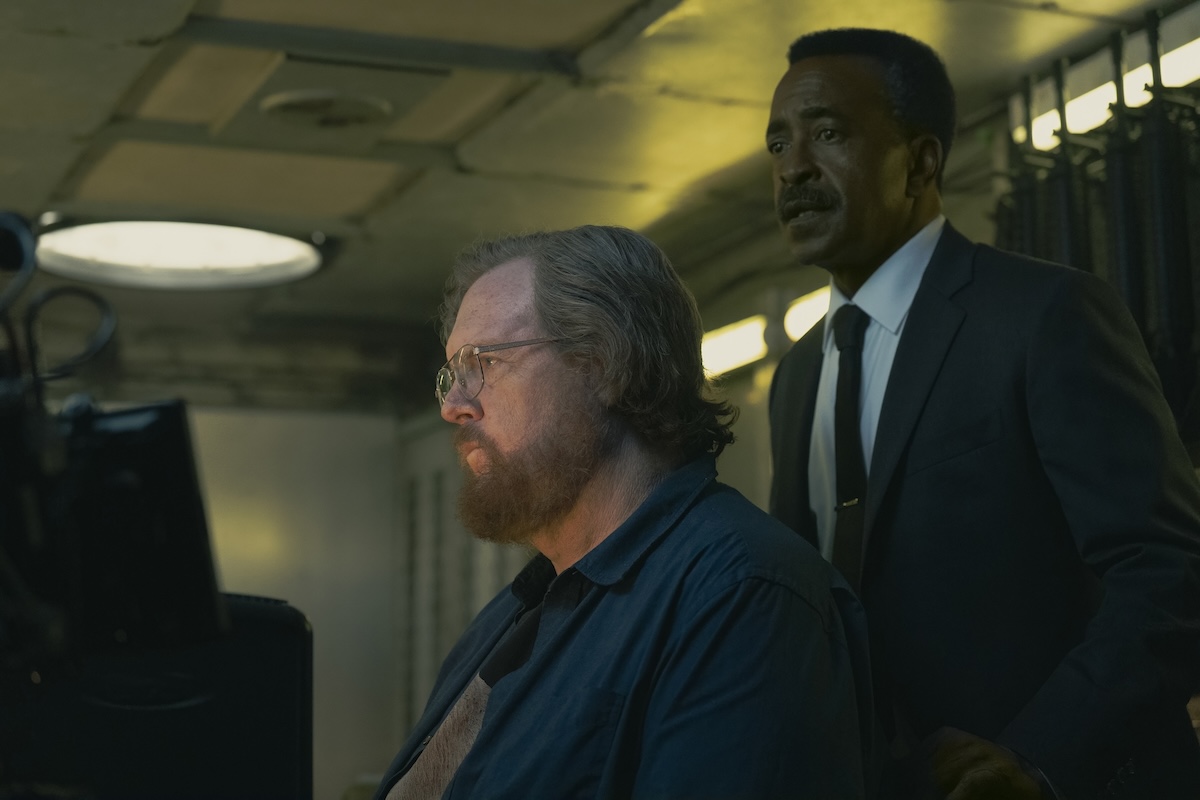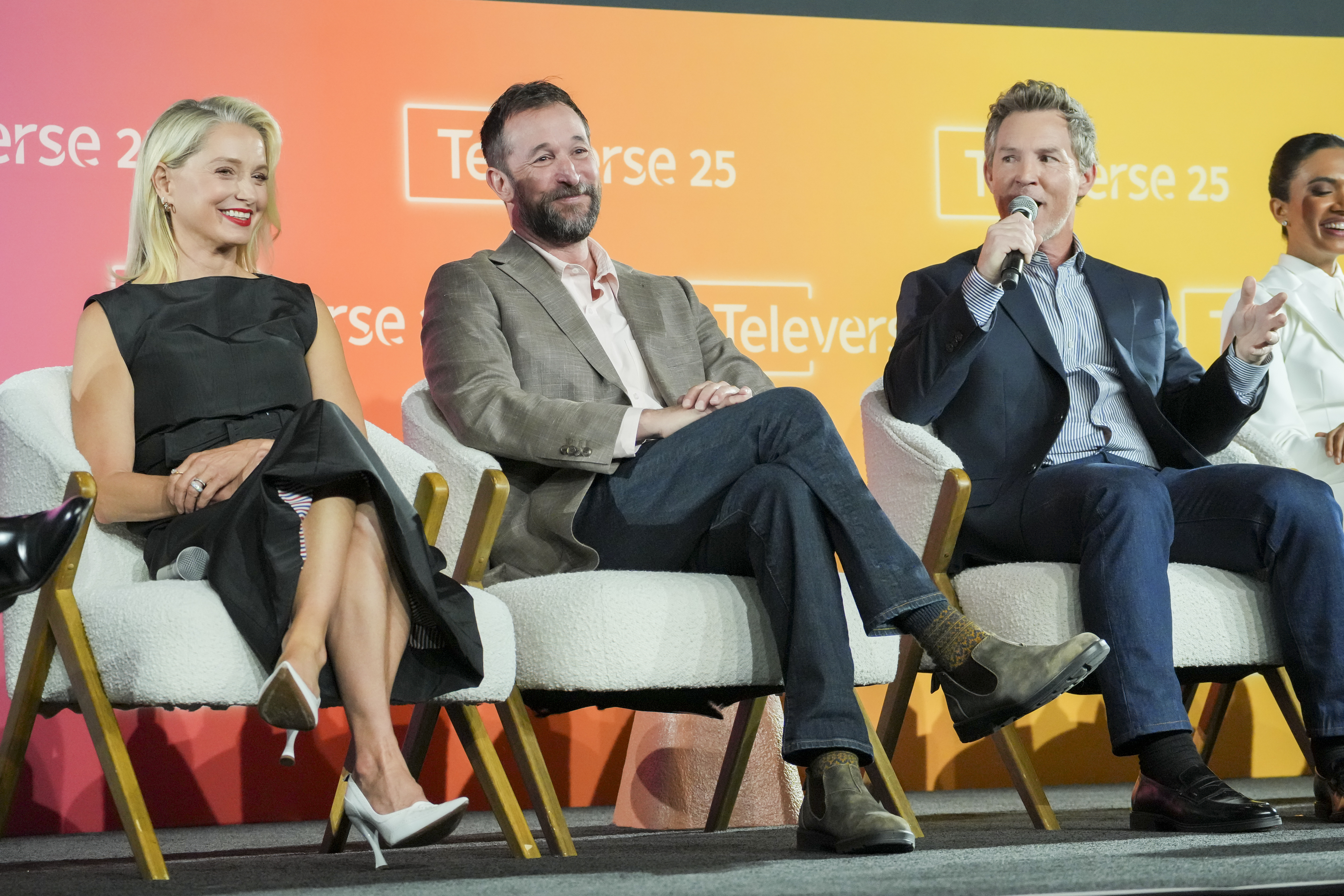So much has changed in the three-and-a-half years “Peacemaker” has been off the air that Season 2 can’t even start before fans come face to face with significant tweaks. The Season 1 recap that plays ahead of the Season 2 premiere (in the critics’ screeners, at least) replaces the finale’s original Justice League cameos (Jason Momoa’s Aquaman and Ezra Miller’s The Flash) with appearances from Justice Gang members Guy Gardner (Nathan Fillion) and Hawkgirl (Isabela Merced). One alteration by addition begs another by subtraction: The recap strangely excludes all footage of Project Butterfly, the bad guys who dominated Season 1, even though Season 2 does acknowledge the dismissal of its leader, Amanda Waller (Viola Davis).
All of these changes, along with a handful of scattered references throughout Season 2, reflect how creator, writer, and director James Gunn aims to reposition “Peacemaker” in DC’s new world order.
In moving on from the DCEU, Gunn’s vision as co-chairman and co-CEO (alongside Peter Safran) includes a shared universe of interconnected characters (a la the MCU) and soloed stories that inhabit their own “Elseworlds” (like “The Batman: Part II”). “Peacemaker,” which premiered months before “The Flash” and “Aquaman 2” oh-so-briefly played in theaters, instinctually makes sense as a standalone story, but Season 2 makes clear that John Cena‘s steadily reforming douchebag still has a home in the new DCU (no “E” required.)
Such changes may be necessary to ensure future seasons of “Peacemaker,” and fans should rejoice accordingly. But even more than the massive atmospheric adjustments happening around him, it’s our ox of a protagonist’s inner transformation that stands out as Season 2’s grandest shift. He, too, is trying to move on from a disastrous past, and he, too, feels the pull to be part of something bigger and better, nicer and newer.
Telling a smaller, simpler story with bigger, knottier emotions, “Peacemaker” Season 2 isn’t just retconning the Max original series into the broader DCU; it’s revamping its antihero into a more traditional hero.
Well, a more traditional hero who still swears too much, fights too rough, and busts a move at the start of every episode. If the revised Season 1 recap doesn’t illustrate what’s different about Season 2, the new dance sequence sure will. That’s right — new. The cast’s quirky-jerky opening titles routine became a buzzy, then beloved part of the first season’s weekly release, and instead of simply repeating the sequence in Season 2, choreographer Charissa Barton returns with fresh steps, set to a different power ballad, incorporating even more cast members.
And it’s fantastic.
That risk pays dividends within a few sittings and, after five of the eight episodes, the return on Season 2 is trending up for largely the same reason. “Peacemaker” could’ve easily continued on by building each subsequent season around a new mission while milking laughs from ludicrous action scenes and goofing around with its affable cast. It still does that — the action is always gruesome and engrossing, while the laughs fly in from every angle (make sure to watch through the credits) — but Season 2 delves deeper into Peacemaker’s internal impasse, as well, examining a personal crisis from which Peacemaker can’t fight himself free.
Apologies for the vagaries, but much of what complicates Peacemaker’s plight is embargoed (despite being revealed in the first episode). Here’s what I can say: Season 2 starts with Chris Smith (Cena), aka Peacemaker, hyped for a job interview. The Justice Gang is looking to expand beyond the four metahumans it has at the end of “Superman,” and Peacemaker thinks he’s a perfect fit. Those reckless homicidal tendencies? Reined in. Team-building skills? Stepped up. Super-powered helmets? Still shiny.

But the hiring committee doesn’t want to hear about any of that. They think they know who Peacemaker is before he sits down for the interview, and their uncaring dismissal sends Chris seeking solace wherever he can get it.
First, he tries Emilia Harcourt (Jennifer Holland), his former team leader and current crush, who also doesn’t want anything to do with him. Despite a connection that’s grown in the six months since she woke up from a coma, Harcourt is too accustomed to shutting people out to let love in. She has her own past traumas to overcome — some of which come to light via flashbacks — but, unlike Chris, she’s not “working on herself” or breaking negative behavioral patterns. (A reversal of gender norms Gunn cheekily acknowledges when Harcourt is diagnosed with a “severe form of toxic masculinity.”) If anything, she’s leaning in after being blackballed from “the entire fucking alphabet of intelligence agencies” — one last “fuck you” from Amanda Waller before she left office. Without a legal outlet for her anger, Harcourt spends her ample free time drinking heavily and picking fights at bars.
The rest of the 11th Street Kids aren’t doing great either. Leota (Danielle Brooks) got dumped by her dreamgirl and can’t get her new business off the ground. Adrian/Vigilante (Freddie Stroma) is stuck working at a fast-casual restaurant called Fennel Farms, and Economos (Steve Agee) is still slaving away for A.R.G.U.S., who recently assigned him the paradoxical task of spying on Peacemaker.
Each character is struggling to marry their personal ambitions with professional demands, which gives “Peacemaker” an office comedy vibe from time to time. These coworkers had something good going before their higher-ups drove them apart, and now their paths forward are either blocked by the powers that be or require them to betray their individual ethos — or each other.
Fittingly, given his physical and figurative size in our story, Peacemaker’s choice is even more extreme. One morning, while using his dad’s old “quantum unfolding storage area that leads to a dimensional nodule outside normal space” — aka a closet with doorways to other dimensions — Chris peeks through a door and discovers an alternate reality where his dad isn’t just alive, but he’s nice. The Auggie (Robert Patrick) Chris grew up with was an emotionally and physically abusive racist who blamed his youngest son for his oldest son’s death. In this other dimension, he’s a sweetheart and a superhero who fights crime alongside Peacemaker, earning accolades and applause wherever they go.
So when Peacemaker’s world rejects him — he can’t be a superhero, he can’t be with Harcourt, and he can’t be with his family (Auggie died in Season 1) — Chris considers walking into the open arms of another, better reality. Why do all the hard work to be accepted by people and places that won’t give you the time of day when you can take the easy route to the good life? (Alt-dimension Peacemaker is also rich, presumably from his super-popular superhero-dom.)
Whether a fresh start (so to speak) is the right fit for him is a question as intriguing for our hero as its broader interpretation is irrelevant to the series — “Peacemaker’s” future home within the DCU has already been decided, so it doesn’t matter if Gunn’s attempt to retrofit him into a universe he wasn’t made for is the right one. But finding out where a rehabilitated villain who’s been repeatedly abandoned by his family, friends, and colleagues actually belongs is a compelling and ambitious arc for Chris Smith, and how it plays out in the final three episodes is an ending I’m actively looking forward to.
“Peacemaker” Season 2 may be a little out of step when it comes to balancing its earnest emotional journey and its brazen blend of action and comedy, but the ambition, imagination, and resonance makes this dance too dynamic to ignore. Change may not be easy or smooth, but it’s also rarely boring. More superhero stories should remember that.
Grade: B
“Peacemaker” Season 2 premieres Thursday, August 21 at 9 p.m. ET on HBO Max. New episodes will be released weekly through the finale on October 9.



